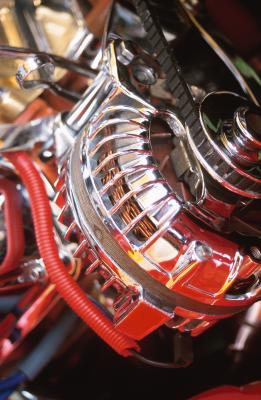
Alternators essentially are miniaturized versions of the generators used at hydro, coal or nuclear power plants. While the alternator's underlying principles are fairly simple, its construction offers plenty of opportunity for failure -- including short circuits and subsequent battery discharge.
An alternator basically is a set of alternating north-south-north magnets sitting on a shaft and spinning inside of a large coil of wire. The alternating magnets essentially "vibrate" the electrons in the wire, causing an alternating current that constantly switches in polarity. The appliances in your house run on a similar alternating current, but a car's alternator directs "one way" current to the battery. The alternator uses a set of one-way diodes or "valves" in the input-output lines to allow energy to flow in through the ground and out through the positive wire, but never the other way around. Electrical energy trapped in the diodes, the energy that attempts to flow against them, turns into heat.
The alternator body is both a ground and a heat sink. If you place your hand on an alternator bracket, you'll probably notice it feels warmer than other accessory brackets; heat from the diodes flows through the alternator body and into the bracket, which helps to absorb and dissipate the heat like a radiator. In the same way, electrical current from the battery flows through the engine block into the bracket and, thus, into the alternator. The positive output wire from the rectifiers connects to the battery's positive terminal, closing the circuit and keeping it charged.
Alternators typically fail in one of two ways. Most often, heat trapped in the diodes end up frying them, reducing alternator output and forcing other diodes to flow more current to compensate. Ultimately, all of the diodes overheat and the alternator fails to put out power of any sort. The second basic failure happens when the copper coils inside the alternator case arc to each other or to the case. When this happens, the arcing components "weld" together and create a short circuit inside the alternator.
Once a short circuit happens in the alternator, the circuit between ground and positive battery terminal -- via the output wire -- closes and starts drawing power. This short circuit can drain the battery completely within a few hours, and almost certainly will if left overnight. There are two basic ways to test for a fault in the alternator. The magnets on the shaft armature aren't magnets at all -- they're actually electromagnets that only magnetize when there's current going to the alternator. With the car off, hold a hacksaw blade to the alternator housing; if it sticks, you've got a constant magnetic field and an internal short. Otherwise, shut the car off, disconnect the positive wire, and use a digital multimeter to test for current draw between it and the battery's positive terminal.